Washington, D.C. — March 19, 2025 For Immediate Release Contact: Hena Zuberi hena@justiceforall.org (202) 922-5878…

House Passes Burma Act of 2019, Burma Task Force Urges Senate To Follow
Last night, the U.S. House of Representatives passed the BURMA Act, H.R. 3190. This legislation, sponsored by Reps. Eliot Engel (D-N.Y.) and Steve Chabot (R-Ohio), holds Burma’s government accountable for their long-running campaign of violence against the Rohingya, indigenous Muslims from Rakhine State, as well as more recent campaigns targeting religious and ethnic minority groups such as the Kachin, Karen, and Chin within the Buddhist-majority country.
In the USA and around the world, there is a growing movement to stop genocide and ensure justice in Burma. We face an enormous challenge, with China and other nations enabling Burma to avoid accountability. United Nations experts state that the genocide is ongoing. The situation is extremely dire with communications restricted in the camps in Bangladesh and no freedom of movement on either side of the border. And yet, Rohingya are being pressured to return to a stateless and dangerous situation back in Burma.
The main challenge to effective action remains in the Senate.
“The US House of Representative has once again resolved to put Burma on notice. We hope Senator Mitch McConnell will finally allow a vote on Senate bill 1186 and that Secretary of State Pompeo will issue a genocide determination,” said Abdul Malik Mujahid, Chair of the Burma Task Force and Faith Coalition to Stop Genocide.
“The time for justice is now. The minorities in Burma have suffered for too long without the world taking their plight seriously.”
Burma Task Force, a program of Justice For All, urges the US Senate to take a major step towards solving the Rohingyas’ dilemma: full restoration of citizenship rights, along with the right to return to their original homes, property, and communities. This is why lawmakers should add a provision to S.1186 officially declaring the actions of the Burmese military to constitute genocide, as well as a provision for the restoration of full sanctions. To encourage democratic reforms and human rights, strong, sector-wide sanctions worked in the past and they would work now.




